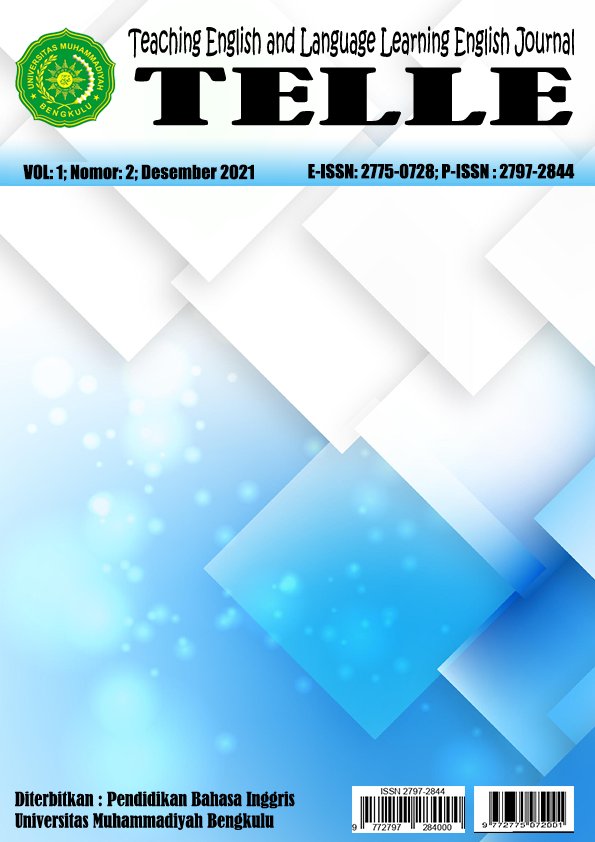STUDENTS’ MOOD IN LEARNING WRITING IN ONLINE CLASS PANDEMIC ERA
DOI:
https://doi.org/10.36085/telle.v1i3.2961Abstract
The objective of this study was to find out the students’ mood in learning writing in Online Class Pandemic Era at University of Muhammadiyah Bengkulu. This study applied a quantitative research design. A total of 45 sixth semester students Academic Year 2020/2021 participated in this study. The data were collected by using a questionnaire and a guided interview to get information about the students’ emotions in learning writing Online. The writers adapted and modified a new category of emotion categorization, called Hourglass of Emotions, based on the emotions wheel proposed by Cambria et al (2018). The Hourglass Model organizes the primary emotions around four affective dimensions (Pleasantness, Attention, Sensitivity, Aptitude). The finding of this research indicated that the students’ mood in learning writing in Online Class Pandemic Era at University of Muhammadiyah Bengkulu was positive. The students confirmed that they feel positive pleasantness, attention, sensitivity, and aptitude in learning writing by online. It is suggested that both the lecturers and the students to keep the positive mood in process of teaching and learning writing online. For further researchers, this research finding can be used as scientific contribution to investigate the students’ mood in learning writing in Online Class Pandemic Era.
Â
Keywords: Students’ Mood, Learning Writing, Online Class, Pandemic EraReferences
Bryan, T., Mathur, S., and Sullivan, K. (1996). The impact of positive mood on learning, Learning Disability Quarterly, Vol. 19, No. 3, pp. 153–162
Brown. 2004. Language assessment : Principles and classroom practices. New York, NY: Prentice Hall, Inc
Cambria, E.; Poria, S.; Hazarika, D.; Kwok, K. (2018). SenticNet 5: Discovering Conceptual Primitives for Sentiment Analysis by Means of Context Embeddings. In: AAAI, pp. 1795-1802
Cianci, A. M., and Bierstaker, J. L. (2009). The impact of positive and negative mood on the hypothesis generation and ethical judgments of auditors, Journal of Practice & Theory, Vol. 28, No. 2, pp. 119–144.
Forest, D., Clark, M., Mills, J., & Isen, A. (1979). Helping as a function of feeling state and nature of the helping behavior. Motivation and Emotion, 3(2), pp. 161-169
Halliday, A. 2010. Doing and Writing Qualitative Research. New Delhi: SAGE Publication
Harmer, J. (2007). The Practice of English Language Teaching. Cambridge, UK: longman.
Heaton, J. B. 1988. Writing English Language Tests. USA: Longman, Inc.
Hogue, A. (2004). Academic Writing (3 Ed). New York: Longman.
Irawan, et al. 2020. Psychological Impacts of Students on Online Learning During the Pandemic COVID-19 from https://doi.org/10.24042/kons.v7i1.6389
Isen, A.M. 1987. The influence of positive and negative effect on cognitive organization. In N.L. Stein, E. Leventhal, & T. Trabasso (Eds.), Psychological and Biological Approaches to Emotion (pp. 75-94). Hillsdale, NJ: Lawrence Erlbaum.
Jeon, J. O. 1990. An empirical investigation of the relationship between affective states, instore browsing, and impulse buying. University of Alabama. Dissertation (unpublished).
Jones, G. R., and George, J. M. (1998). The experience and evolution of trust: Implications for cooperation and teamwork, The Academy of Management Review, 23 (3), p. 531.
Nordquist, Richard. 2017. Lingua Franca. accessed from https://www.thouhtco.com/what-is-a-lingua-franca-169123
Nunan,D. 1999, Second language teaching and learning, Boston: Heinle and Heinle. p. 48
Rosenberg, M. J. (2000). The e-learning readiness survey: 20 key strategic questions you and your organization must answer about the sustainability of your e-learning efforts
Sedikides. (1992). Mood as a Determinant of Attentional Focus.
Sugiyono. (2011).Metode Penelitian Pendekatan Kuantitatif, Kualitatif dan R & D. Bandung: Alfa Beta
Urdan, and C. Weggen. , 2000. Corporate e-Learning: Exploring a New Frontier, Berwyn, Penn.: Hambrecht & Co.
Watson, D., and Tellegen A. 1985. Toward a consensual structure of mood. Psychological Bulletin, 98, pp. 219–235
Weigle, S. 2002. Assesing Writing. USA: Cambridge University Press





